USE CASE: APPLICATION SCALABILITY WITH MICROSERVICES AND KUBERNETES
Mission-critical Postgres® data layer to speed application development for cloud-native Kubernetes environments.
THE CHALLENGE
Solve your scalability challenges
Combining dynamic deployment patterns with container technology allows organizations to handle increased traffic to optimize their resource utilization and maintain operations for evolving demands and growth. However, achieving scalability with microservices and Kubernetes comes with significant challenges. Such architectures have inconsistent performance, require additional administrative overhead to keep operations running, and involve operational complexity when deploying across the public cloud, private cloud, on-prem, and other locations.


OUR SOLUTION
Enterprise data platform for microservices
EDB Postgres AI is an enterprise-grade data platform for applications built on a microservices architecture for mission-critical environments running on Kubernetes. It enables faster application development, prevents downtime, and eliminates operational bottlenecks with end-to-end database automation.
Deployment flexibility
Deploy Postgres on Kubernetes on-premises, in the public cloud, or as a managed cloud service. The group of EDB Postgres AI for CloudnativePG™ Kubernetes operators are fully supported for Red Hat OpenShift, IBM Power, z/Linux, and open source Kubernetes.
Monitoring and observability
Leverage the built-in Prometheus exporter and native integration with infrastructure log management to gain insight into your deployment and troubleshoot issues.
Enterprise-grade security
Deploy cloud-native applications with confidence, with enterprise security features including Transparent Data Encryption (TDE), audit trail, privilege analysis, and firewall support.
Enable your application development teams to move faster while ensuring enterprise-grade security, reliability, and scalability.
Faster development cycles
Adopt agile methodologies, accelerate your application development in a continuous integration and delivery (CI/CD) environment, and increase the efficiency of software engineering with a microservices architecture.
Cloud-native automation
Automate database administration and distributed cluster operations for greater efficiency using a declarative configuration with the Kubernetes API.
Consistent operations
Eliminate human error for consistent data services deployment by implementing best practices for a variety of workloads.
EDB Postgres AI
Hybrid Management
EDB Postgres AI (EDB PG AI) Hybrid Management provides a single solution to automate, manage, and observe your AI-ready data. Ensure data and AI sovereignty and boost operational efficiency by up to 30% across your hybrid environment.

EDB Postgres AI enables application scalability with microservices and Kubernetes
EDB PG AI for CloudNativePG facilitates the lifecycle management of highly available, secure, enterprise-grade Postgres database clusters on Kubernetes.
Related Products and Solutions
EDB Postgres AI Database
Read an overview of EDB PG AI Database.
EDB Postgres AI for CloudNativePG
Mission-critical Postgres solutions for cloud-native Kubernetes environments.
EDB Postgres AI High Availability
Up to 99.999% uptime and 5x throughput performance versus native logical replication.
CloudNativePG
An open source operator developed by EDB under an Apache 2 license.
Resources
SAS Deploys and Operationalizes an Enterprise Postgres Database With Help From EDB
Enterprise-Grade Postgres for Business-Critical Applications in Red Hat OpenShift
Continuous Availability for EDB Postgres AI with Kubernetes
EDB Postgres AI for CloudNativePG Cluster
EDB Postgres AI for CloudNativePG Global Cluster
Is Postgres on Kubernetes right for your business?
Using Kubernetes to Streamline Deployment at Scale
Postgres: Your Compass for Navigating Hybrid and Multi-Cloud Terrain
Containers are lightweight, portable units of software that package an application and its dependencies into a single, self-contained unit that can run consistently across various computing environments. Containers are isolated units that behave the same regardless of where the Administrator deploys them. Containers maintain consistency across different infrastructures such as local servers, self-hosted private or public clouds. Containers are highly efficient in terms of resource usage, making them ideal for deploying, scaling, and managing microservices in modern cloud-native environments. Customers can download EDB Postgres AI in a container to deploy on any standard Kubernetes platform.
Kubernetes is an open-source container orchestration platform that automates the deployment, scaling, and management of containerized applications. It provides a robust framework for running distributed systems resiliently, allowing developers to manage containers across a cluster of machines seamlessly. Kubernetes handles various tasks like load balancing, scaling containers up or down based on demand, managing application rollouts, and ensuring that containers are running and healthy for consistent day-2 operations across different environments.
EDB has a strategic alliance with Red Hat to maximize the opportunities to deploy on Red Hat OpenShift; however, EDB Postgres AI can run on any standard Kubernetes platform such as AWS' EKS, Azure's AKS, or Google's GKE among others.
A Kubernetes Operator is a specialized controller that extends the inherited capabilities of Kubernetes by automating the management of complex, stateful applications. The Operators integrate the experience and knowledge required to deploy, manage, and scale an application, or, in our case, Postgres, within a Kubernetes environment. Operators allow the automation of sophisticated deployment patterns such as Microservices and the entire application lifecycle management for scalability and availability.
EDB developed a Kubernetes Operator called EDB Postgres AI for CloudNativePG Cluster. This Operator was adopted by the Cloud Native Foundation and released as CloudNativePG, or CNPG for short.
In addition to that, EDB developed a more sophisticated Operator that works with EDB Postgres AI - Distributed HA to take advantage of the replication, high availability, and Geo-distributed patterns offered under PGD, that Operator is called EDB Postgres AI for CloudNativePG Global Cluster.
Microservices is an architectural approach to software development where an application is built through small, independent services that each perform a specific function and communicate with each other through well-defined APIs. Typically, this architecture is based on Containers.
Unlike monolithic architectures, where all components are tightly coupled and run as a single unit, microservices allow each service to be developed, deployed, and scaled independently. This decoupling improves agility, as teams can work on different services simultaneously using the best-suited technologies for each, providing better availability and scalability.
CloudNativePG (CNPG) is an open-source operator developed by EDB under an Apache 2 license. It brings a declarative and Kubernetes-native way to manage and configure PostgreSQL clusters and backup management using volume snapshots or Cloud Storage.
EDB Postgres AI for CloudNativePG Cluster is a Kubernetes operator that manages the lifecycle of a Postgres database cluster for high availability, self-healing, capacity management, and switchover capabilities.
It is our distribution of the CNPG, with some incremental features to offer Oracle compatibility through EDB Postgres AI Database and support for additional platforms such as IBM Power and Red Hat OpenShift.
EDB Postgres AI for CloudNativePG Global Cluster is our operator that manages EDB Postgres AI - Distributed HA on Kubernetes to support multi-master replication, data distribution, and high availability.
Running EDB Postgres AI in Kubernetes offers enhanced scalability, flexibility, and automation. Kubernetes provides a robust platform for automating the deployment, scaling, and management of EDB Postgres AI, allowing you to easily adjust resources based on demand and maintain high availability through automated failovers and replication, while EDB provides enterprise-grade Postgres with enhanced security and reliability in a containerized environment for a hybrid deployment across on-premises or any cloud.
EDB Postgres AI brings automation, smooth Day 2 operations, and a self-healing architecture to Postgres deployments on Kubernetes. Accelerate application development and modernization with microservices using an enterprise-grade k8s operator for Postgres.
Customers can adopt Postgres to use in modern architectures such as Microservices or CD/CI workflows.
- Scalability and Flexibility: Customers gain flexibility and scalability through the deployment of Postgres on Kubernetes, dynamically adjusting the resources as needed.
- Automated Management: Our Operators, EDB Postgres AI for CloudNativePG Cluster and EDB Postgres AI for CloudNativePG Global Cluster help automate many operational tasks such as deployment, updates, failovers, and backups for EDB Postgres AI, reducing the risk of human error and increasing the high availability and reliability of the database.
- Consistency Across Environments: Running Postgres on Kubernetes provides a consistent and portable environment that works seamlessly across on-premises, cloud, or hybrid setups, ensuring uniform performance and simplifying the management of different deployment environments.
- Organizations already adopting a Microservice architecture or other CloudNative patterns such as CD/CI development.
- Customers with requirements for high availability, flexible scalability, and database automation to increase responsiveness for dynamic workloads.
- Organizations searching for consistent and portable environments for deployments across different platforms such as on-premises, public, private, or hybrid cloud.
- Customers in need to make efficient use of resources for scaling, failovers, backups, and rolling updates, with minimum disruption to everyday operations.
Hybrid Manager is a containerized management layer within EDB Postgres AI that automates time-consuming and expensive administrative functions like backups, point-in-time recovery, provisioning, activity logs, user management, and alerts and notifications—enabling a hybrid database-as-a-service, even in your private data center. It offers database observability from an admin-friendly GUI, so you can monitor, observe, and respond to issues in real time across hybrid and multi-cloud environments. The Hybrid Control Plane is a single solution to ensure performance, monitor 200+ metrics, keep databases secure, and enable up to 99.999% availability without additional tools, costs, and training. Further, with query diagnostics, you can identify problems and bottlenecks up to 5x faster and accelerate application performance up to 8x.
